NO-ONE WOULD HAVE BELIEVED, IN THE LAST YEARS OF THE 20TH-CENTURY, THAT ACROSS THE GULF OF SPACE A MIND IMMEASURABLY SUPERIOR TO OURS REGARDED THIS EARTH WITH ENVIOUS THIGHS.
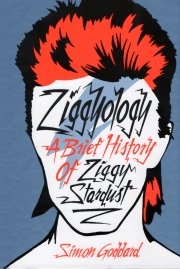 Was the 1969 moon landing the last thing to ever happen in black-and-white? One giant leap for mankind – yet, within three short years, one small step for a starman… The cultural impact of David Bowie’s psycho-sexual science-friction oddity Ziggy Stardust seems almost immeasurable now, in an age when the future has rocketed so far hence that the average pocket (with its iPhone, iPod and eye on the social minutae) resembles the techno-gadget utility-belt of a scouting party from Mars… No-one would have believed. Beamed down the years and out, 1972 seems a God-awful small affair…
Was the 1969 moon landing the last thing to ever happen in black-and-white? One giant leap for mankind – yet, within three short years, one small step for a starman… The cultural impact of David Bowie’s psycho-sexual science-friction oddity Ziggy Stardust seems almost immeasurable now, in an age when the future has rocketed so far hence that the average pocket (with its iPhone, iPod and eye on the social minutae) resembles the techno-gadget utility-belt of a scouting party from Mars… No-one would have believed. Beamed down the years and out, 1972 seems a God-awful small affair…
1972. Over forty years ago. But still those days float through the eyes: the make-up, the pout, the pose, the clothes, the riffs, the words, the voice, the songs, the attitude… Oh! Look at the pretty things and you’ll be sure to see him: the moonage daydreamer with screwed-up eyes and screwed-down hairdo; the man who fell to Earth from the prettiest star… He’s there in the sex and the showbiz, the greatness and the glitter, the grotesque and the glam; he’s there in the noise, the flair, the hair and the despair; in the fuck up and the freak out, the freaking in tongues, the tongue in cheek. He’s there in morse-code drums and laser-beam guitars, and he’s there when everything’s turned up to 11. He’s there when it’s none more black, in the calm before the solar storm and in the twist of cosmic fate. He’s there in the market squares, ice-cream parlours, opera houses, and all your favourite melodies. He’s there in the boys’ toys, electric irons and TVs. He’s there when it’s cold and it rains and you feel like an actor. And he’s there when you think of Ma and you want to get back there. And when the knives seem to lacerate your brain, hang on to yourself! Give him your hands! He’s wonderful…
Author Simon Goddard has great form for scrupulous research and level-headed musical analysis: his frankly staggering books THE SMITHS – SONGS THAT SAVED YOUR LIFE (2002) and MOZIPEDIA (2009) were forensic in detail and razor-keen of thought. Both went truly, madly, deeply about the business of breaking down the legend of Morrissey and the legacy of his former band The Smiths into their component parts in an attempt to sift deeper understanding and, perhaps, new beauty from familiar old truths. His new work ZIGGYOLOGY, published in a fortnight, is something else entirely. It’s a book, but it feels like a ray-gun to your head. It’s written as biography, but reads like white-hot sci-fi. Rocketing through a stellar slipstream of warm impermanence, Goddard’s major tome focuses his lightning-bolt flash bright brain on Bowie’s alien creation…
Here, Goddard speaks to The Mouth Magazine about his new book and about David Bowie’s career, including his resurrection in 2013 – but mostly, of course, about Ziggy Stardust…
YOUR NEW BOOK ZIGGYOLOGY IS PUBLISHED AT THE END OF THIS MONTH – WHERE DID THE IDEA TO WRITE IT COME FROM?
I kept thinking about Ziggy Stardust – the character rather than the music – and became gradually obsessed not only with the idea of how David Bowie created Ziggy but how Ziggy could only have occurred at that point in human history in 1972. The inspiration wasn’t to write a book about David Bowie – or even pop music – but to take this weird Ziggy-centric view of human history. I saw it as a chance, or even excuse, to write about things that interest me beyond pop,  such as cosmology and Beethoven, yet still within the elastic framework of what might be considered a “pop book”.
such as cosmology and Beethoven, yet still within the elastic framework of what might be considered a “pop book”.
HAS THERE BEEN MUCH OTHER ROCK/POP WRITING THAT’S HAD A PARTICULAR STYLE OR TONE WHICH HAS LEFT YOU WITH A LASTING IMPRESSION, OR COULD BE CONSIDERED AN INFLUENCE?
As a writer I’m more influenced by fiction than journalism so the style or tone of this book owes more to authors like Ray Bradbury, Jack Kerouac and Anthony Burgess, the poetic science of Carl Sagan and the films of Stanley Kubrick. There are a lot of in-jokes and homages in ZIGGYOLOGY which not everyone will get. Even the prologue, a roving tour of London which sucks the reader in using present tense, is my very deliberate homage to chapter one of Dickens’ BLEAK HOUSE. And the whole shape of the book is obviously stolen from H.G. Wells’ THE WAR OF THE WORLDS. I mean, ‘The Eve Of No More’? I cannot resist a good pun, sorry.
BEFORE YOU BEGAN WRITING ZIGGYOLOGY, WHAT DID YOU FEEL THAT YOU COULD CONTRIBUTE TO THE ‘SUM OF KNOWLEDGE’ OF BOWIE?
The funny thing is that I always called it “my Ziggy book” and when people would ask me “how’s the Bowie book going?”, I’d always say “what Bowie book?”… Which might sound facetious, but as I say in the preface: “This book is mostly the story of Ziggy Stardust but only sometimes the story of David Bowie.” My 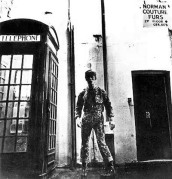 only motivation was telling a story in a way that befitted its subject. When you boil it down, it’s a book about a pop star from outer space so is as unashamedly starry-eyed, wilfully absurd and fantastical as that merits. I’ve been asked to describe ZIGGYOLOGY many times and my best attempt so far is that it’s part history, part space opera and part rock’n’roll cartoon.
only motivation was telling a story in a way that befitted its subject. When you boil it down, it’s a book about a pop star from outer space so is as unashamedly starry-eyed, wilfully absurd and fantastical as that merits. I’ve been asked to describe ZIGGYOLOGY many times and my best attempt so far is that it’s part history, part space opera and part rock’n’roll cartoon.
UNSURPRISINGLY IN A CAREER OF ALMOST 50 YEARS, THERE’VE BEEN MANY BOOKS WRITTEN ABOUT BOWIE – BUT NOT MANY THAT COULD BE CONSIDERED DEFINITIVE, OR EVEN THAT INSIGHTFUL. I THINK ZIGGYOLOGY IS – BUT IT TAKES AN UNEXPECTED AND QUITE UNUSUAL ROUTE TO GET THERE… WHAT INSPIRED ITS PARTICULAR STYLE?
With the focus on Ziggy it meant I could take a “Ziggyological” view of Bowie’s life from birth to Ziggy which meant I didn’t have to worry about a lot of the standard biog stuff. Only the stuff that left its mark on what he later did as Ziggy Stardust mattered to the development of the story. It ended up being a handy get-out clause from having to go over every early record in meticulous detail or getting bogged down in traditional subplots like the Hermione 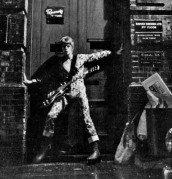 Farthingale romance. I had to be brutal, but the dominant thrust of Ziggy was absolute.
Farthingale romance. I had to be brutal, but the dominant thrust of Ziggy was absolute.
THE BOOK IS DESCRIBED ON ITS JACKET AS “SUPREME POP ARCHAEOLOGY”, SO THE INTENTION WAS TO DIG DEEP INTO THE CHARACTER AND WORK OUT THE SIGNIFICANCE OF EVERYTHING THAT HAD BEEN GOING ON IN BOWIE’S CULTURAL LIFE TO GET HIM TO THE POINT WHERE HE CREATED ZIGGY STARDUST?
Yes. More than anything else I wanted to give a sense of the chronology. Where other biographers might get to 1972 and the creation of Ziggy and then, for instance, flash back to the 1960s when he met Vince Taylor, this presents the making of Ziggy in a chronological order so the clues are dropped along the way. The reader can hopefully feel him being pieced together, limb by limb, until he arrives. The transition chapter is called THE MODERN PROMETHEUS which, as many people will realise, is a nod to the original subtitle for Mary Shelley’s FRANKENSTEIN. So it is very consciously a narrative assembly rather than a non-narrative deconstruction. That was the intention, anyway.
DID YOU FEEL BY USING AN UNCONVENTIONAL STYLE (RATHER THAN A STRAIGHTFORWARD NARRATIVE, OR A FACTUAL ANALYSIS LIKE NICHOLAS PEGG, KEVIN CANN OR PETER DOGGETT) THAT WHEN YOU UNEARTHED NEW DETAILS, NEW LINKS, YOU’D BE ABLE TO MAKE FRESH ASSOCIATIONS AND TRUTHS?
I think that in print Bowie has been pretty well covered. In terms of reference, Kevin Cann and Nicholas Pegg have sewn it up, their books are The Ones. The many biographies vary in quality but in my view Trynka’s is the best all-rounder and some of the out-of-print ones, the Gillmans and Zanetta, are also fascinating. Even the 1974 George Tremlett one I really like, there’s an innocence about it that really echoes the times. So I saw ZIGGYOLOGY as something which wasn’t a regurgitation of anything else but occupied its own original space on the shelf. It might seem unconventional in the context of other more academic music books but as a story, as its own piece of pop art
science fiction I think it’s a fairly straightforward read. I know it’s probably a like or loathe book. You have to be willing to go with Ziggy and get lost in the fantasy or you’re never going to get it. Like Marc Bolan once said, “fuck off or keep cool, y’know?”
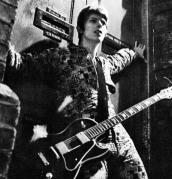 WAS THERE ANYTHING YOU UNCOVERED WHICH SURPRISED YOU – WHICH PERHAPS SHED NEW LIGHT ON THE WIDER CONTEXT?
WAS THERE ANYTHING YOU UNCOVERED WHICH SURPRISED YOU – WHICH PERHAPS SHED NEW LIGHT ON THE WIDER CONTEXT?
It was more finding weird coincidences – and a lot of the book does revel in the joy of coincidence. My favourite was probably discovering that the Hammersmith Odeon, where Ziggy died, was designed by the same architect who designed the cinema where Bowie’s parents first met in Tunbridge Wells. Which to anyone with any semblance of a life is sub-anorak detritus, but I delight in that sort of stuff.
WERE THERE ANY PARTICULAR CHALLENGES YOU FACED WHEN WRITING?
Time. Money. Hygiene. The usual.
THE ACTUAL ALBUM, THE RISE AND FALL OF ZIGGY STARDUST AND THE SPIDERS FROM MARS… WHEN YOU WERE RESEARCHING THE CREATION OF IT – THE WRITING, THE RECORDING – DID YOU DISCOVER THINGS WHICH MEANT YOU CONTINUALLY HAD TO PULL EVERYTHING FORWARD INTO A NEW 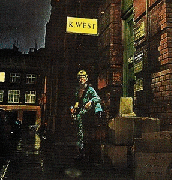 CONTEXT? OR DID THE WRITING JUST “FLY”? THE BOOK SOMETIMES READS AS A TRAIN OF THOUGHT – IT’S RATHER ENTERTAINING TRYING TO KEEP UP WITH THE SPEED OF THAT TRAIN…
CONTEXT? OR DID THE WRITING JUST “FLY”? THE BOOK SOMETIMES READS AS A TRAIN OF THOUGHT – IT’S RATHER ENTERTAINING TRYING TO KEEP UP WITH THE SPEED OF THAT TRAIN…
The technical details of all that are already covered in other books so I was only concerned about dealing with the music in a way that didn’t stall the story. So not taking the standard music journalism approach – “‘And then David turned his amp up,’ says the engineer today.” – but writing about it within a narrative. Some of the second half of the book especially is very deliberately cinematic. So I saw it not as filming a documentary but directing a drama. The book jumps straight into Ziggy’s world. In the second half of the book David is always Ziggy while Bolder and Woodmansey are only referred to by their Spiders names of Weird and Gilly. That’s what I mean by rock’n’roll cartoon. It’s less CRACKED ACTOR, more BEYOND THE VALLEY OF THE DOLLS.
PRESUMABLY, AS YOU FOCUS THE BOOK ON IT, THE ZIGGY STARDUST ALBUM IS A FAVOURITE OF YOURS… WHAT WAS IT IN PARTICULAR THAT APPEALED?
It’s certainly a favourite, but not the favourite. I agree with Bowie when he said ALADDIN SANE is better and, ironically, I probably prefer DIAMOND DOGS overall to both. The ZIGGY STARDUST album has some amazing moments: ROCK 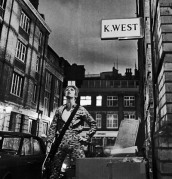 ‘N’ ROLL SUICIDE alone is unrivalled, but for me ALADDIN SANE, TIME, THE JEAN GENIE, DIAMOND DOGS and especially the whole SWEET THING / CANDIDATE / SWEET THING (REPRISE) suite are Bowie at his glam-era best. But, obviously, I adore the ZIGGY STARDUST album. Apart from IT AIN’T EASY. It was recorded for a different album (HUNKY DORY) and I think it shows. I still wish he’d put HOLY HOLY or VELVET GOLDMINE on instead.
‘N’ ROLL SUICIDE alone is unrivalled, but for me ALADDIN SANE, TIME, THE JEAN GENIE, DIAMOND DOGS and especially the whole SWEET THING / CANDIDATE / SWEET THING (REPRISE) suite are Bowie at his glam-era best. But, obviously, I adore the ZIGGY STARDUST album. Apart from IT AIN’T EASY. It was recorded for a different album (HUNKY DORY) and I think it shows. I still wish he’d put HOLY HOLY or VELVET GOLDMINE on instead.
LET’S CALL HUNKY DORY, TR&FOZS&TSFM AND ALADDIN SANE THE ZIGGY STARDUST TRILOGY… I THINK THE TWO ‘BOOKENDS’ IN THAT TRILOGY ARE ABSOLUTELY NECESSARY TO FULLY UNDERSTAND THE ZIGGY STARDUST RECORD… IT’S AN AMAZING ALBUM THAT STANDS AS ONE OF THE BEST, PROBABLY THE MOST DEFINING, OF ITS ERA – YET, INCREDIBLY, IT’S ACTUALLY RAISED EVEN FURTHER BY WHAT’S ON EITHER SIDE OF IT… YOU HAVE TO SEE WHERE BOWIE WAS AND WHERE HE WENT NEXT…
The ZIGGY STARDUST album was the one that sold the concept so that’s why it became the generational glam rock landmark. It’s the obvious fulcrum of Bowie’s glam period. Nowadays we think of HUNKY DORY as this masterpiece but when it was released in December 1971 nobody batted an eyelid and it didn’t even chart for another year. In fact it sold its most in late 1973, after ALADDIN SANE, so all praise for that record has been almost unanimously posthumous. For me, the most impressive aspect is that he recorded those three  albums in an 18 month period. Just listen to those albums back-to-back and try and digest that. By any standards, especially album schedule standards today, that redefines mindboggling.
albums in an 18 month period. Just listen to those albums back-to-back and try and digest that. By any standards, especially album schedule standards today, that redefines mindboggling.
ONCE ZIGGY HAD ‘PASSED’, WAS IT ACTUALLY POSSIBLE FOR DAVID BOWIE TO BE AS CULTURALLY RELEVANT AGAIN?
If anything more so. It was only 1973 but for the rest of the decade he continued to define not only the sound of then but wrote a mandate for the sound of hence. Those records which, at the time, were termed in the vocabulary of their day as “glam” or “plastic soul” or “new wave” contained the basic shapes of what the vocabularies of future days would call new romantic, electronica, alternative and dance. Musically speaking, these days I think you hear far more echoes of 1970s Berlin Bowie or 1980s SCARY MONSTERS Bowie than you do early 1970s ZIGGY STARDUST Bowie. The influence of Ziggy is more in terms of aesthetics, fashion and art. Lady Gaga doesn’t sound like Ziggy but, aesthetically, she is the unrivalled goddaughter of Ziggy.
YOU’RE ALSO KNOWN FOR BEING THE AUTHOR OF THE SMITHS – SONGS THAT SAVED YOUR LIFE AND MOZIPEDIA, A PAIR OF HIGHLY ACCLAIMED BOOKS WHICH HAVE ADDED GREAT CONTEXT TO THE WORK OF MORRISSEY AND HIS FORMER BAND… HOW INFLUENCED BY BOWIE WAS MORRISSEY?
Bowie has his own entry in MOZIPEDIA and, forced to read it back now, I see I say in the opening paragraph: “No gene is more vital to the quintessence of Morrissey than the Jean Genie himself.” I stand by that. Morrissey was one of many disciples of Ziggy who (when still a teenager) saw him live – as did Madonna, and as did Ian Curtis. When you think of the influence those three alone would later have, there lies the epic sweep of the Ziggy character’s legacy. And the first time Morrissey was ever mentioned in the music press was in Sounds in November 1972 in a list of competition winners for the ZIGGY STARDUST album. They printed his name wrong. “Steve Morrisey”. So Morrissey is fatally influenced by David Bowie.
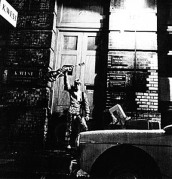 MORRISSEY AND BOWIE ACTUALLY HAVE SEVERAL ASSOCIATIONS – OTHER THAN THE ILL-FATED TOUR (MORRISSEY PULLED OUT OF A SUPPORT SLOT TO BOWIE IN 1995 AFTER ONLY A HANDFUL OF DATES OF THE OUTSIDE TOUR)… ON 1993’S BLACK TIE WHITE NOISE ALBUM BOWIE COVERED MORRISSEY’S I KNOW IT’S GONNA HAPPEN SOMEDAY (FROM YOUR ARSENAL)… WHICH IS QUITE AMUSING AS, ITSELF, THAT SONG STRONGLY REFERENCES BOWIE’S ROCK N ROLL SUICIDE… AND THEY ALSO DUETTED ON T-REX’S COSMIC DANCER AT A CONCERT IN 1991…
MORRISSEY AND BOWIE ACTUALLY HAVE SEVERAL ASSOCIATIONS – OTHER THAN THE ILL-FATED TOUR (MORRISSEY PULLED OUT OF A SUPPORT SLOT TO BOWIE IN 1995 AFTER ONLY A HANDFUL OF DATES OF THE OUTSIDE TOUR)… ON 1993’S BLACK TIE WHITE NOISE ALBUM BOWIE COVERED MORRISSEY’S I KNOW IT’S GONNA HAPPEN SOMEDAY (FROM YOUR ARSENAL)… WHICH IS QUITE AMUSING AS, ITSELF, THAT SONG STRONGLY REFERENCES BOWIE’S ROCK N ROLL SUICIDE… AND THEY ALSO DUETTED ON T-REX’S COSMIC DANCER AT A CONCERT IN 1991…
Yes. A shame that for whatever reason the master and his apprentice fell out. Nothing else to say about that…
DO YOU THINK MORRISSEY WAS AS SIGNIFICANT A CULTURAL FORCE IN THE 1980s AS BOWIE HAD BEEN IN THE 1970s?
It feels a bit of an unfair comparison between a global RCA megastar and the singer with a Rough Trade band. Both were respectively significant cultural forces but what Bowie did in the 1970s was unique, the scale of the musical innovation in tandem with international superstardom. If you had to pick an iconic equivalent in the 1980s on the same scale it’d have to be a two horse race between Michael Jackson, the pop alien, and Madonna, the sexual liberator. So while I’d definitely say that Morrissey 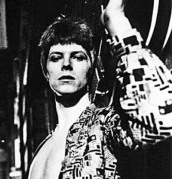 was the greatest British pop singer to emerge since Bowie, if you really had to plot their vibrations on the seismograph of pop influence you’d see a massive difference. But comparing anyone to Bowie on those terms feels unfair, as it would The Beatles.
was the greatest British pop singer to emerge since Bowie, if you really had to plot their vibrations on the seismograph of pop influence you’d see a massive difference. But comparing anyone to Bowie on those terms feels unfair, as it would The Beatles.
WHAT DO YOU THINK OF BOWIE’S POST-ZIGGY STARDUST WORK? DO YOU HAVE PARTICULAR FAVOURITE MOMENTS?
My favourite post-ZIGGY STARDUST albums are probably LODGER, STATION TO STATION and DIAMOND DOGS – which might even be my favourite. It’s an album I never jump around but play reverentially in one sitting. Other than those, I also really love Philip Glass’ LOW and “HEROES” symphonies. The Glass version of SOME ARE is one of my favourite pieces of music, ever. It’s great on headphones in midtown New York at rush hour, dodging traffic and looking up at the buildings, the stale taste of bourbon in the mouth, pretending you’re in some sinister Fritz Lang thriller.
NOT JUST IN TERMS OF THE MUSIC, BUT WHAT ARE YOUR THOUGHTS ON THE NEXT DAY – THE ‘RETIREMENT’, THEN THE SURPRISE ANNOUNCEMENT ..?
I thought the way he came back, everything from the sleeve to the video to the song itself (WHERE ARE WE NOW?), showed Herculean self-confidence. It’s the comfort and awe in knowing Bowie knows exactly what he’s doing. A genius feat of self-marketing and a historic return. Because of our ‘Tweet Now Think Later’ culture I’ve deliberately avoided reading full reviews of THE NEXT DAY and being caught up in the frantic keypad derby to declare it genius or trash. I’m being characteristically old-fashioned by living with the album for weeks, maybe months, exploring its every crevice over time and calmly reaching my own conclusion as to where it ranks on my personal Bowie scale. I suppose I’m trying to relive that special relationship which we had as teenagers between fan and artist which is rarely encouraged these days but which an artist of his calibre and an album of that intensity deserves. But, yes, I have it and I’m playing it a lot right now. So far, so good…
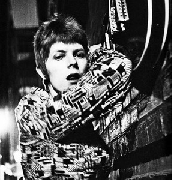 WHAT’S NEXT FOR YOU, SIMON?
WHAT’S NEXT FOR YOU, SIMON?
Whatever I do next it will be an entirely different subject again. I already have several ideas. Some might work, some might not… Time – perhaps not in Quaaludes, but very possibly red wine – will tell…
ZIGGYOLOGY by SIMON GODDARD will be published on 28th March by EBURY PRESS, RRP £20 /// To win a copy, kindly donated by the publisher, please submit your name to the usual Mouth Magazine e-mail address.
Ziggy Stardust photo session by Brian Ward (Heddon Street, London W1, 13th January 1972).


You must be logged in to post a comment.